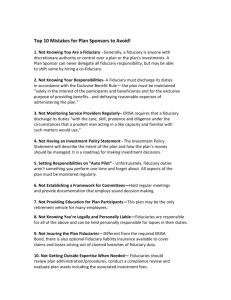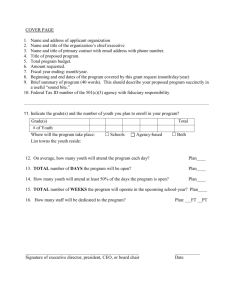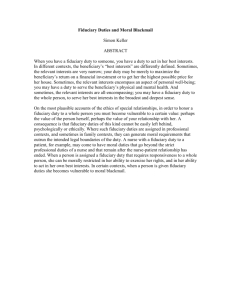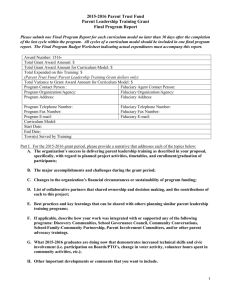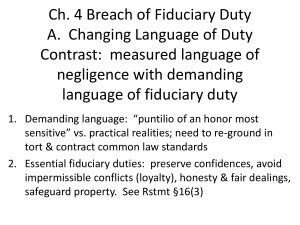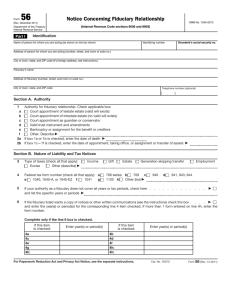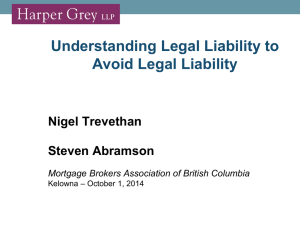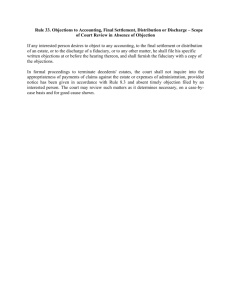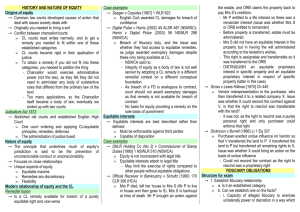The Earl of Oxford Case: equity prevails in conflict Fusion Fallacy
advertisement
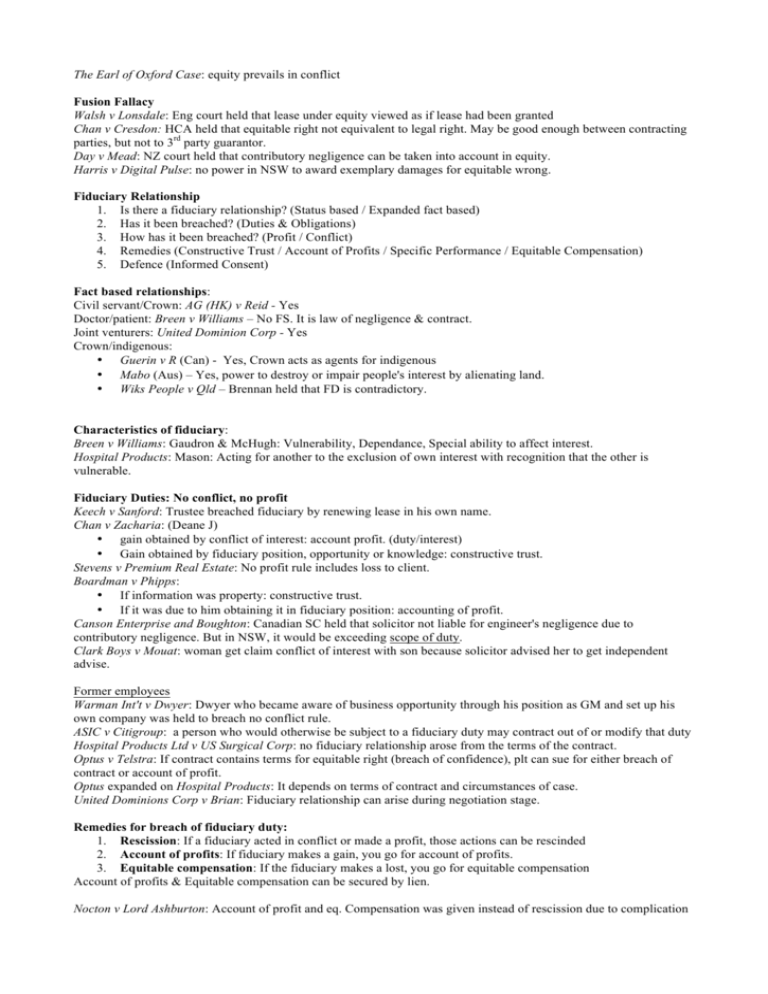
The Earl of Oxford Case: equity prevails in conflict Fusion Fallacy Walsh v Lonsdale: Eng court held that lease under equity viewed as if lease had been granted Chan v Cresdon: HCA held that equitable right not equivalent to legal right. May be good enough between contracting parties, but not to 3rd party guarantor. Day v Mead: NZ court held that contributory negligence can be taken into account in equity. Harris v Digital Pulse: no power in NSW to award exemplary damages for equitable wrong. Fiduciary Relationship 1. Is there a fiduciary relationship? (Status based / Expanded fact based) 2. Has it been breached? (Duties & Obligations) 3. How has it been breached? (Profit / Conflict) 4. Remedies (Constructive Trust / Account of Profits / Specific Performance / Equitable Compensation) 5. Defence (Informed Consent) Fact based relationships: Civil servant/Crown: AG (HK) v Reid - Yes Doctor/patient: Breen v Williams – No FS. It is law of negligence & contract. Joint venturers: United Dominion Corp - Yes Crown/indigenous: • Guerin v R (Can) - Yes, Crown acts as agents for indigenous • Mabo (Aus) – Yes, power to destroy or impair people's interest by alienating land. • Wiks People v Qld – Brennan held that FD is contradictory. Characteristics of fiduciary: Breen v Williams: Gaudron & McHugh: Vulnerability, Dependance, Special ability to affect interest. Hospital Products: Mason: Acting for another to the exclusion of own interest with recognition that the other is vulnerable. Fiduciary Duties: No conflict, no profit Keech v Sanford: Trustee breached fiduciary by renewing lease in his own name. Chan v Zacharia: (Deane J) • gain obtained by conflict of interest: account profit. (duty/interest) • Gain obtained by fiduciary position, opportunity or knowledge: constructive trust. Stevens v Premium Real Estate: No profit rule includes loss to client. Boardman v Phipps: • If information was property: constructive trust. • If it was due to him obtaining it in fiduciary position: accounting of profit. Canson Enterprise and Boughton: Canadian SC held that solicitor not liable for engineer's negligence due to contributory negligence. But in NSW, it would be exceeding scope of duty. Clark Boys v Mouat: woman get claim conflict of interest with son because solicitor advised her to get independent advise. Former employees Warman Int't v Dwyer: Dwyer who became aware of business opportunity through his position as GM and set up his own company was held to breach no conflict rule. ASIC v Citigroup: a person who would otherwise be subject to a fiduciary duty may contract out of or modify that duty Hospital Products Ltd v US Surgical Corp: no fiduciary relationship arose from the terms of the contract. Optus v Telstra: If contract contains terms for equitable right (breach of confidence), plt can sue for either breach of contract or account of profit. Optus expanded on Hospital Products: It depends on terms of contract and circumstances of case. United Dominions Corp v Brian: Fiduciary relationship can arise during negotiation stage. Remedies for breach of fiduciary duty: 1. Rescission: If a fiduciary acted in conflict or made a profit, those actions can be rescinded 2. Account of profits: If fiduciary makes a gain, you go for account of profits. 3. Equitable compensation: If the fiduciary makes a lost, you go for equitable compensation Account of profits & Equitable compensation can be secured by lien. Nocton v Lord Ashburton: Account of profit and eq. Compensation was given instead of rescission due to complication of company going insolvent. Philmer v Duke Group: contributory negligence does not affect equitable compensation Mcguire v Makaronis: Equity of rescission of mortgagors is conditional on repayment of principal & interest. Corin v Patton: If you have legal title, equity can say you hold it purely as nominee and the fruits are held by you as constructive trust for the person you did wrong. (As close as ) Defences to Breach of Fiduciary Obligations Test of fully informed consent: 1. knowledge: party has to know what is proposed 2. benefit: beneficiary has to expect a benefit 3. freedom of decision: person consenting has to have capacity Mcguire v Makaronis: For a fully informed consent, what is required is a question of fact and there is no real test. It depends on the circumstances of the case. Consent can be prescriptive or poscriptive (ex post facto) Egg v Devey: Acceptance of money was acquiescence of father's administrators. Stevens v Premium Real Estate: NZSC said there is a positive duty to disclose. Not in NSW. No prescriptive duty in Aus, only postscriptive (not to act in conflict/profit) Breach of Confidence Seager v Copydex: [Someone] who has received information in confidence shall not take unfair advantage of it – Lord Denning MR. Optus Network v Telstra Corp: (Replaces Coco v AN Clark) 4 elements to establish a breach of confidence: 1. information in question must be identified with specificity 2. it must have the necessary quality of confidence 3. it must have been received in circumstances importing an obligation of confidence; and 4. actual or threatened misuse of the information without consent. (unauthorised use) Defences: authorisation, national interest, national security, public interest in disclosure. Transitory publication will not destroy confidentiality. ABC v Lenah Game Meats:The requirement that disclosure or observation of info or conduct would be highly offensive to a reasonable person of ordinary sensibilities is the relevant test for protection of information. (Court will protect info that is obtained surreptitiously) Wright v Gasweld (Kirby P) • How much skill and effort was expended to acquire the info • Has the employer jealously guarded the info? • Was the employee made aware of the confidential nature of the info? • Is there an industry practice in keeping this sort of info secret? • Has access to the info been controlled? Know how: knowledge, skill and experience of employee Del Casale v Artedomus: If info is the result of substantial know how, that is not confidential info. If info is ascertainable by enquiry, experiment or know how, it is not confidential. O'Brien v Komesaroff: info was know how and was too general. Moorgate Tobacco v Phillip Morris: Basis of obligation lies in the notion of an obligation of conscience arising from circumstances in or through which the info was communicated or obtained Authorisation Lennon v Newspapers: Implicitly authorised because Lennon would talk about his sex life publicly. Naomi Campbell Case: Her statement of how she was drug free, was not implicit authorisation. Mosley v News Group: The only possible defence here is a public interest defence that Max Morsely was a Nazi sympathetic like his dad and this was a Nazi themed orgy. Prince Jefri Bolkiah v KPMG: JB won because the confidence was not to put your best efforts to keep it confidential. It was to keep it confidential. Here it is a low level of risk. Specificity: It has to be specific enough to be a matter for injunction. Test for trade secrets: Difference between confidential information and know how. Obligation in conscience: Whether there is a contract. Whether done surreptitiously or secretively. Unauthorised use: You can have implicit authorisation (John Lennon & Naomi Campbell Case)

